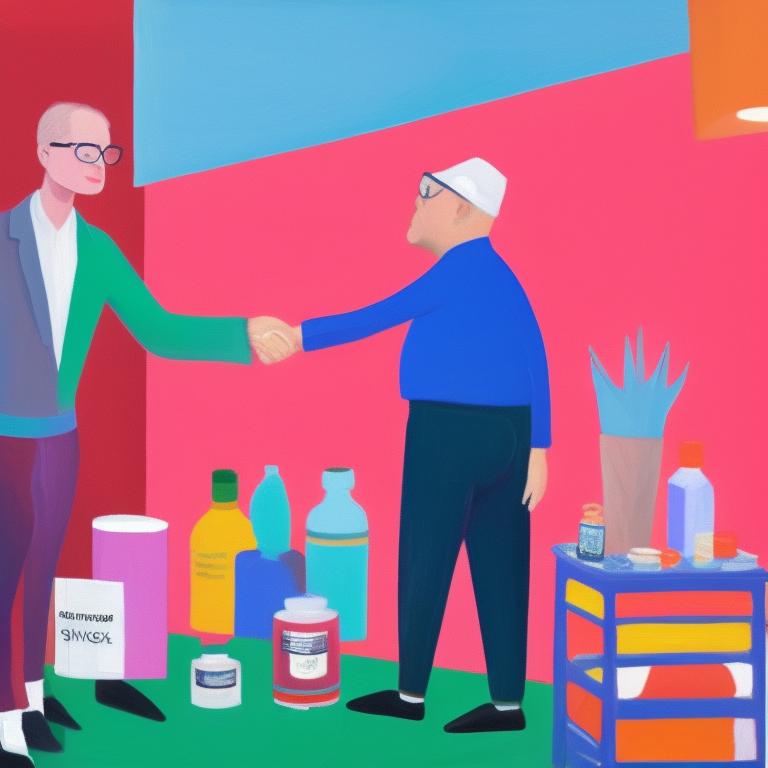How to monetize a podcast: Nine proven ways (with examples)
Content Monetization
Have you poured your heart and soul into your podcast, building a loyal audience that hangs on your every word? Now, you might be wondering, how can I turn this passion project into a profit machine? Well, wonder no more!
In this article, we'll unveil nine proven ways to monetize your podcast, along with real-world examples to show you exactly how it's done. So, whether you're a seasoned podcaster with a dedicated following or a newbie just starting out, this guide has something for you.
Let's dive in and turn your podcast into a financial force to be reckoned with!

Main takeaways from this article:
- Understanding the dynamics of how podcasts make money can be differentiated into two main channels: direct and indirect monetization.
- Transforming podcast episodes with only audio content into shareable video content through tools like Klap opens up new avenues for audience engagement, boosting the podcast's online presence.
- A broad array of strategies, including sponsorships, advertising, and subscription models, provide diverse income streams for podcasters.
- Creative tactics such as selling merchandise, hosting live events, collaborating within podcast networks, or selling information products are successful ways of monetizing your podcast.
- Listener support and donations are significant revenue-generating means, stressing the importance of maintaining a loyal audience base.
- Utilizing Klap to transform and share podcast content can significantly enhance your podcast's success by boosting reach, engagement, and, ultimately, profitability.

How do podcasts make money?
Podcasts use a two-pronged approach to make money: direct monetization and indirect monetization.
- Direct monetization turns your podcast itself into a product. This involves charging listeners for premium content, subscriptions, or exclusive access.
- Indirect monetization leverages your podcast's audience to sell other products or services. This could be through sponsorships, affiliate marketing, or even selling your own merchandise.
Let's explore some specific examples of these strategies in the next section!
Top nine podcast monetization strategies and examples
Ready to unlock revenue from your podcast? Let's explore nine proven strategies and delve into some real-world examples to kickstart your podcast monetization journey.

1. Transforming video podcast episodes into engaging shorts
Already rocking the video podcast world? Great move! But how can you squeeze even more value out of your existing content and supercharge your monetization strategy? Enter Klap, a game-changer for video podcasters.
Klap takes your existing video podcast episodes and transforms them into bite-sized, ultra-engaging short-form content.
Here's how Klap unlocks new monetization avenues for your video podcast:
- Short-form powerhouse: Attention spans are shorter than ever. With the latest enhancements, Klap not only lets you create snackable video clips but also refines your raw footage by removing unwanted segments, silences, and enhancing audio quality. These bite-sized pieces are ideal for platforms like Instagram Reels, TikTok, and YouTube Shorts, where engagement and discovery are king.
- Targeted monetization: Short-form content allows you to tailor messaging to specific platforms and audiences, offering highly targeted advertising or affiliate marketing opportunities within each short clip. These features ensure every clip is polished and professional, enhancing viewer attraction.
- Fueling the long-form flame: Short-form content acts as a powerful promotional tool. By showcasing the best parts of your podcast in bite-sized pieces, you can drive viewers to your full-length episodes, boosting overall audience engagement and potential for monetization there as well.
- Content efficiency masterclass: Stop reinventing the wheel! Klap uses your existing video content and optimizes it with advanced editing tools, saving you valuable time and resources. This allows you to focus on creating even more engaging podcast episodes and maximize your content's reach.
Expand your reach, attract new audiences, and unlock exciting new revenue streams – all without the need for extensive re-recording or editing.

2. Sponsorships and advertising
Advertisers value the personal touch podcasters can bring to ads, which often results in higher engagement with listeners. Podcast sponsors, in turn, can benefit from the credibility and trust that podcasters have with their engaged audience. The more a podcaster’s listener base aligns with an advertiser’s ideal customer demographics, the higher the value of sponsorship or advertising.
Getting started with sponsorships and advertising
To get started with sponsorships and podcast ads, begin by:
- Building an engaged listener base: Advertisers want to see that you have a dedicated audience that engages with your content. This can be measured in the number of downloads, shares, comments, or other forms of engagement.
- Finding relevant advertisers: Look for products and services that align with your content and audience preferences. Relevance is key. Advertisers will be more interested in sponsoring if they feel your audience is part of their target market.
- Negotiating spots and rates: Rates for advertising spots vary depending on various factors like length of the ad, positioning (pre-roll, mid-roll, post-roll), and listener count. Positioning your ads strategically not only increases your revenue but also your listener's experience.

3. Exclusive content and subscriptions
The exclusive content model allows you to leverage your most engaged fans and transform their enthusiasm into a financial benefit. By offering them more than the average listener gets, you reward their dedication and support of your podcast. This exclusivity could take the form of extra interviews, behind-the-scenes footage, or early access to episodes.
Here's why this strategy is valuable:
- Empowerment: By subscribing, listeners have a way to directly support your podcast, making them feel included and valued. It creates a sense of community and connection.
- Extra value: In return for their subscriptions, listeners receive additional content, enhancing their experience and the value they get from your podcast.
- Steady revenue: Subscription fees provide a stable, predictable revenue stream, creating security for your podcast's financial future.
Getting started with exclusive content and subscriptions
Launching exclusive content and podcast subscriptions requires some planning and strategy. Here are some actionable steps to help you get started.
- Define your exclusive content: As a podcast host, decide what kind of unique, valuable content you can produce regularly. This could be extended interviews with guests, behind-the-scenes content, or ad-free episodes.
- Choose a platform: There are numerous platforms, such as Patreon, Memberful, or Apple Podcasts Subscriptions, where you can host exclusive content and manage your subscriptions.
- Pricing structure: Set fair prices for your subscriptions. Consider offering different tiers with varied perks to give listeners options.
- Promote: Promote your exclusive content and subscriptions on all your channels. Build excitement around launches, new episodes, and unique perks.

4. Listener support and donations
Your podcast listeners tune in because they appreciate your valuable insights, enjoy your content, and feel a connection with you. This relationship establishes an unspoken bond between you and them, making listener support a natural extension of this connection.
Here are some unique advantages of listener support and donations:
- Keeps authenticity intact: Unlike radio shows or TV programs, podcasting thrives on raw, unfiltered conversations that offer an organic touch. Relying solely on listener support allows you to keep that authenticity without diluting your content with ads or sponsored messages.
- Financial stability: Listener support can be a reliable source of recurring income. Since donors are usually listeners who genuinely enjoy your content, they're often more than happy to support your podcast financially. Even a few dollars received in donations can add up in the long run.
Getting started with listener support and donations
Here are a few actionable steps to encourage your listeners to contribute:
- Set up a Patreon account: Patreon is a platform designed for video and podcast creators to receive financial support from their audience. It enables your most loyal listeners to contribute regularly, which, in turn, can provide a much-needed boost for your podcast.
- Create bonus content: One effective means to incentivize donations is by offering donors access to exclusive content or perks. Consider creating bonus episodes or offering behind-the-scenes content to reward those who support your work.
- Communicate your intentions: Be open with your listeners about your desire for financial support. Inform them of how their contributions will be used and what improvements they can expect. Transparency is key to developing trust with your audience.

5. Selling merchandise
Podcast merchandise is not just a source of direct revenue; this podcast monetization strategy provides several unique benefits as well.
- Brand promotion: Your listeners essentially become walking billboards when they sport or use your branded merchandise.
- Recurring revenue: Merchandise allows you to continue earning from your existing episodes and helps you maintain a steady cash flow.
- Community building: Merchandise can nurture a sense of unity and belonging among your listeners, further securing their loyalty toward your brand.
Getting started with selling merchandise
Transform your listeners into avid supporters and walking ads with these actionable tips:
- Choose items that resonate with your brand and audience: Whether it's t-shirts, mugs, or stickers, make sure the items connect to your show or the interests of your listeners.
- Involve your listeners: Involve your audience in the process of creating merchandise. Run polls and ask for design ideas to ensure that the end product is something they'll truly love and want.
- Quality over quantity: Remember, the physical items you sell represent your brand. High-quality merchandise can correlate to high-quality content in a listener's mind.
- Consider partnering with a fulfillment company: Companies like Gelato or Printful handle the production, sale, and shipping of your merchandise, leaving you free to focus solely on your podcast.
- Promote your merchandise: Use social media platforms and your podcast itself to advertise the availability of your merchandise. Always link back to your store or place of purchase.

6. Affiliate marketing
In a cluttered advertising space, people are more likely to trust and value recommendations from voices they believe in—like yours. Affiliate marketing can create a seamless and non-intrusive revenue stream by promoting products or services that align with your podcast's content and audience.
Getting started with affiliate marketing
Here are some actionable tips and examples to kickstart your affiliate marketing monetization journey.
- Do your research: Understand your audience. Know their interests, preferences, and necessities. This will help you align with companies offering products or services your listeners are likely to be interested in.
- Join affiliate programs: Amazon Affiliates, Commission Junction, and ShareASale are some popular choices. Remember, it's essential to join programs that offer products relevant to your audience.
- Shout-outs and endorsements: Once you have those affiliate links, incorporate them naturally into your podcast. This can be in the form of product reviews, guest interviews, or direct recommendations during your podcast episodes.
- Promoting affiliate links: Don’t forget to share these affiliate links on your social media accounts and podcast website, maximizing the chances of conversions. Make sure you're transparent about these being affiliate links to maintain trust with your audience.

7. Hosting live events and workshops
Hosting live events and workshops offers multifaceted value. Here's why it's an effective monetization strategy:
- Making personal connections: They facilitate direct communication and interaction with listeners, turning passive consumers into engaged followers.
- Exclusive experiences: Offering unique, in-person experiences can be a strong selling point for listeners who are eager to be part of a community.
- Sponsorship opportunities: Live events also open the door to partnerships with local businesses or relevant brands that might sponsor your event and contribute to your revenue stream.
- Generating extra revenue: Beyond admission fees, there can be additional monetization opportunities such as merchandise sales, VIP experiences, or workshop materials.
Getting started with live events and workshops
Here are actionable steps you can take to get started:
- Identify your audience’s wants: Start by understanding your listeners. What kind of live event would engage them? A live podcast recording, a Q&A, or a hands-on workshop related to your podcast topics?
- Start small: You don’t need to jump straight into a large-scale event. Start with a small meetup or an online webinar to gauge interest and familiarity with the format.
- Collaborate: Consider partnering with other podcasters or influencers in your niche for joint events. This will not only help extend your reach but also split the costs.
- Offer value: Make sure that your event offers value. This could be through exclusive content, skill development, or networking opportunities.
- Market your event: Promote your events on your podcast platform, and consider using social media, email newsletters, and local media for outreach.

8. Utilizing podcast networks and collaboration
Just like any other industry, the world of podcasting profits greatly from its own range of networks and collaborations. For podcasters, these networks open the door to a wider listener base, shared resources, cross-promotion, and potential sponsorship deals.
By connecting with other podcasters, you can even create opportunities for co-hosting and guest appearances, which are excellent for extending your reach and influence.
Getting started with podcast networks and collaboration
Join a podcast network
- Research: Explore networks like Wondery, Earwolf, and Radiotopia that feature podcasts with a theme or audience similar to yours.
- Approach: Once you find a fitting network, approach them professionally with a clear pitch that accentuates the value your podcast brings to the table. Make sure your content aligns well with the network's ethos and existing lineup.
- Benefit: Joining a network can offer tangible benefits, such as shared advertisement revenues, access to professional production and marketing services, and a community of fellow podcasters for brainstorming and support.
Collaborate with fellow podcasters
- Find potential collaborators: Look for fellow podcasters who resonate with your brand and content. This could be through social media, podcasting forums, or networking events.
- Get creative with collaborations: You could guest on their podcast, invite them as a guest on yours, co-host a special event, or combine your skills to create new and unique content.
- Highlight mutual benefits: Make sure to articulate the mutual benefits of your collaboration. These could include a broader audience reach, cross-promotion, or shared expertise.

9. Selling information products
Information products, such as ebooks, webinars, online courses, or digital guides, serve as a direct way of adding value to your listener’s lives by imparting knowledge or solving a problem they are facing.
Your podcast content forms an ideal foundation for creating information products. Moreover, if your listeners respect your advice and genuinely value the information you share, they would likely be willing to purchase more specialized, in-depth content from you.
Getting started with selling information products
Moving beyond podcasting to develop and sell information products might seem demanding. By adhering to some tried-and-true steps, you can streamline the process and potentially create a significant new revenue stream.
- Identify your area of expertise: If you’re hosting a podcast, you’re presumably talking about something you’re well-versed in. Identify a topic related to your podcast that you could delve into more deeply in an info-product.
- Choose your product format: This could be a step-by-step online course, an in-depth ebook, a series of webinars, or even a comprehensive collection of templates or guides.
- Create the product: Take time to develop a high-quality product that truly provides value. Depending on the chosen format, you might need to write, design, film, edit, or collaborate with others.
- Price strategically: When pricing your information product, consider factors such as production costs, the value you’re delivering, and what your target audience would be willing to pay.
- Market and sell: Announce your product on your podcast, social media channels, and blog—anywhere your audience spends time.
Supercharge your podcast's success with Klap
Leverage your podcast's potential by partnering with Klap, the AI-powered video editing tool revolutionizing content creation.
With Klap, you can convert long-form podcast content into bite-sized video snippets perfectly tailored for social media platforms. With enhanced capabilities, Klap helps optimize raw footage by removing bad takes, cutting silences, improving audio quality, and reframing shots.
Let your creativity shine as you produce high-quality, engaging videos that resonate with your audience on platforms like Instagram, TikTok, and YouTube Shorts.
Klap is the ultimate companion for video podcasters seeking to amplify their monetization efforts. Try for free now!

